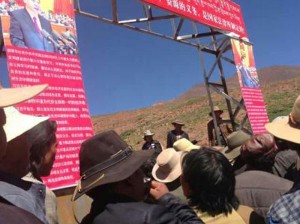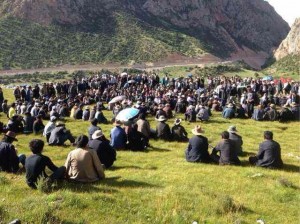China has acknowledged that police officers dispatched to respond to the recent mining protest in Gedrong Zatoe County in the Qinghai province in Eastern Tibet have shot dead a local Tibetan man named Babo. The Chinese news agency Xinhua claimed on August 30 that the shots were justified in order to defend the police against attacks by local protesters. The official report claimed that Babo was leading a group of protesters and that he was attacking police with knives, clubs and rocks, causing 17 police officers to be injured. “Babo was later fatally wounded by a stray bullet when police fired warning shots with an anti-riot shotgun. He was rushed to hospital but died on August 16,” reported Xinhua.
“Two weeks after the event, this admission by the Chinese authorities that by accident they killed a Tibetan who was attacking police is simply not a tenable account of events,” said Mary Beth Market, President of the International Campaign for Tibet. She also stressed that “imposing a blackout on information from the area once again underlines the vulnerability of the Tibetan people, and the lack of accountability from the Chinese authorities both to the Tibetan people themselves and to the international community.”
A Tibetan monk in exile named Kunchok Dhondup said that one of his friends managed to visit a hospital where he witnessed 14 injured Tibetans. He was however blocked from visiting other hospitals in the region.

Mining protesters in Dzatoe county display banners of statement by President Xi Jinping urging protection of the environment.
Photo: RFA
Xi Jinping, the Chinese president, has said that China would never pursue temporary economic growth at the expense of environmental degradation and that environmental polluters will be severely punished, but there is documented evidence of government seals giving central government approval for mining. Zhang Qingli, the Secretary of the Party Committee of the Tibet Autonomous Region said “we won’t let Tibet’s mine reserves just sleep there” and “we also won’t allow the ecology to be damaged by unregulated mining.” China has been facing difficulties trying to get supplies of raw materials domestically, which has led to an increase in the pace at which Tibetan minerals are being exploited, together with a lack of concern for the environment. Mining work has resumed in the Zatoe area of Qinghai province despite the opposition just weeks earlier.





 Print
Print Email
Email